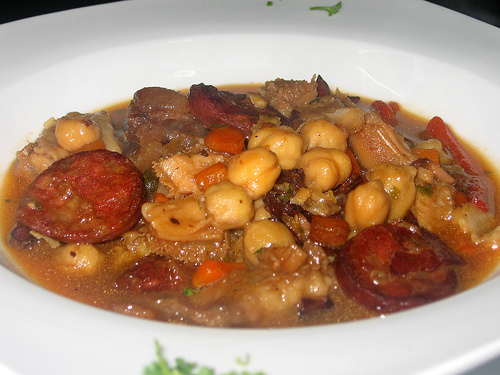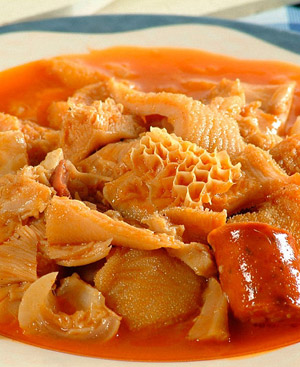
Origin: Castilla La Mancha, Madrid

Callos a la Madrileña, or Madrid-style tripe is a Spanish dish with humble origins, like so many, as tripe it's always been an inexpensive ingredient. We know that it's been consumed since the 15th century, based on the so called "wastes" of beef.
Some theories say that immigrants from Asturias brought the custom of eating tripe from their land, however this is hard to confirm as there are many similar dishes out of Spain as well, for instance caen style tripes in France.
Despite its history being mostly unknown, we do know that recipes for the dish have been found that date back to the year of 1599 in a cook book by Guzmán de Alfarache de Mateo Alemán. In 1607, it appeared in another recipe by Domingo Hernández de Maceras who says that it is 'a beef tripe delicacy'.
Although callos a la madrileña is the best known preparation, tripe is eaten all over the Iberian peninsula. Callos was established as a typical Madrid dish since the 19th century.
Before then callos a la madrileña was served in lowly taverns and dinning rooms, but when the luxury restaurant Lhardy included it in its menu it stopped being only a popular dish and its ingredients, considered only for the poor such as pig's snout, trotters and tripe are served alongside finer meats in the most elegant restaurants Madrid.
This typical Spanish dish is served in many bars and restaurants of Madrid and is normally accompanied by chorizo and blood sausage. Despite being a very simple recipe, it is still highly revered and many people and many restaurants claim to have the best recipe. It might be a good idea to ask the locals in Madrid where the best callos a la madrileña are served.
Although it's a fairly simple recipe, callos a la madrileña requires a very long cooking time, which makes it suitable mostly for restaurants or large families. The ingredients are cooked in a meat broth with paprika, tomato sauce and garlic. However due to this long cooking time, there are now a number of pre-made and tinned varieties on sale in the Spanish supermarkets, taking the hard work out of enjoying this traditional dish. Still, it doesn't beat home cooking, and it will certainly taste better after all of the effort needed to make it.
Despite being named after Madrid, the dish is still made in other regions of Spain. Along the south coast of Spain, they change the ingredients to make it taste more of the sea. Meanwhile in Asturias they use various types of local sausages for their version of the meat stew. It is also a typical dish in Catalonia, although they include a lot more beans in their recipe.
Should you ever travel to Madrid we recommend you to try them in their place of origin! In the meantime however, why not try and make this typical Spanish stew at home, the recipe for which can be found below:

Ingredients:
Preparation: